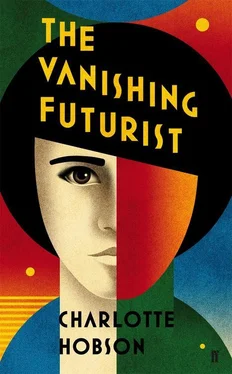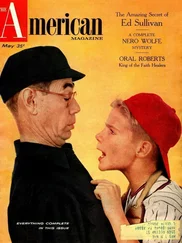We packed up and trundled the Machine home with none of our usual exhilaration. Nikita was gloomy and irritable, and for the first time in over a week, we did not take the Propaganda Machine out the following evening.
* * *
I sit here surrounded by my papers in my neat little modernist armchair, produced for the masses and sold inexpensively. On my walls are prints of paintings produced by the Russian avant-garde, now celebrated and sold for vast sums. If I look along my bookshelves, the lettering on every cover, every magazine – if it does not intend to look deliberately old-fashioned and folksy – is the plain sans serif of avant-garde pamphlets. From the new concrete towerblocks soaring up all over Hackney to my teacups, knives and forks, the stuff of our lives now echoes the drawings of students who worked at the Moscow design studios Vkhutemas in the cold, dark winters of the Civil War.
And I wonder about the Propaganda Machine and many of the designs of the Russian avant-garde. They were playful – the whims and self-dramatising jokes of clever children. They were also deadly serious, made in conditions of real suffering. They seemed insignificant among the clanging chaos of the Revolution, but they were levers to change lives, alter thoughts, create new ways of living; this we knew, straightforwardly, just as we knew that a teaspoonful of air resistance could make us fly, a wisp of steam could drive a locomotive. On their own merits they have survived: now, decades later, our houses, clothes, china, patterns, magazines, objects look and feel as they do at least partly because of the Soviet artists and poets who imagined them.
Yet, extraordinary as this achievement is in itself, it would not have satisfied their creators. The modern aesthetic was always a means to a far greater goal – a just society. And I can’t help thinking as I look around at my comfortable house and our well-designed modern city, how did we become so childishly easy to please, so unambitious? Why did we settle for so little?
* * *
Among the papers from the Institute that have survived is a scribbled account in my own hand entitled ‘The First Journey to the Future – 25 October 1918’. As I reread it, I suddenly feel the most extraordinary sensation, a sort of muffled, tingling wave of emotion, part agitation, part excitement. I laugh out loud, and the sound rackets alarmingly about my house.
Slavkin was despondent for several weeks after Lunacharsky’s snub. Once the whiff of entertainment had tainted the PropMash, he lost all interest in it. It was true, also, that as time went on we became more aware of the arbitrary effect it had on people. Many felt benevolent and peaceful and reported greater faith in the future of the Revolution, but some made cynical remarks, such as, ‘Socialism don’t smell so good in real life, though, do it?’ And there were also cases when patients behaved erratically: several became amorous and forced themselves on to passers-by; one elderly man ran around making chicken noises. In another, very unfortunate case, a woman experienced some sort of mental crisis and emerged convinced that she was the Tsarina, a delusion that I believe persisted for some weeks. She caused chaos by insisting on inspecting the queue as if they were troops on parade and growing tearful when she saw the state of their buttons.
‘How can I have wasted my time on such nonsense?’ Slavkin groaned. ‘Superficial, pointless. I’m a fool. We need something that works at the level of atoms – of particles.’
He was already turning to the latest ideas on particle physics and to Einstein’s revelations.
On the evening of 25 October, Slavkin was exuberant. He sat on the floor in front of the lit stove and read from a pamphlet by the light of a couple of smoky, stinking nyedyshalki – no-breathers, wicks stuck in pots of oil.
‘Listen to this,’ he said. ‘Time is our medium now. It’s by Khlebnikov. “Until now, the brain of the people has been hobbling about on three legs (the three axes of place). We, by cultivating the brain of mankind like farmers, will attach the fourth leg to this puppy, namely – the axis of time . Lame puppy! No longer will your miserable yelping grate on our ears!
‘“People of the past are no wiser when they assume that the sails of the State can be hoisted only on the axes of space. We, draped in our cloak of nothing but victories, build our young union by raising a sail on the axis of time, and warn you that our scale is greater than Cheops, and our task is bold, magnificent and stern… Black sails of time, now sound! ”
‘You see?’ he went on triumphantly. ‘He’s talking about Einstein’s Theory of Relativity. How many centuries will it take to build Communism at this rate? Our real task is to find an application for Einstein’s theory, to accelerate our passage to the future. We can’t dawdle around on the edges as we are now – taking a step forward, then running backwards, squabbling, concerning ourselves with superficialities…
‘We have put in place the basics of the commune. Now it is time for the real work to begin. We need to have a real understanding of Communism, what it will feel like in our bodies and our souls.
‘I have prepared a dose of a narcotic that is used by the Siberian animists. I recognised the mushrooms in the market – they used to grow near my village. There are mild physical symptoms such as contraction of the pupils, perspiration and increased heart rate, which will cause you no ill effects. The psychological effects are more extreme. You should experience a miraculous heightening of reality, lasting for some hours. They will lead you into another world – a world of joy, clarity and sensual delight. And this is where we use the Propaganda Machine. I have prepared new stimuli, all is fresh and ready. Each of you will undergo a vaccination. It will have an unimaginably powerful effect on a brain under the effect of the narcotic. I shall take some readings from your brains – the frequencies at which the particles vibrate – this will not take long. Then you will need to rest until the narcotic wears off.’
‘What on earth gave you this idea?’ asked Fyodor, frowning.
‘The shamans use the mushrooms to discover their totems and to form a bond between the tribe. They claim it as their magic, when of course we know it is merely the physiological effect of the drug on the brain. It allows the individual to escape his own consciousness, even if only for a few hours, and to experience a sense of union with all existence. Shamans and witch-doctors of all religions see this as oneness with God. We understand it in simpler terms – it is the sensation of Communism.’
‘Might it not damage the brain?’
‘Oh no, the physical effect wears off within twenty-four hours. I have discussed it with Marina. But the psychological effect can be life-changing. This, after all, is what we are hoping for.’
There was a pause, doubt in the air.
‘I didn’t know you were planning something like this,’ murmured Fyodor, always cautious.
‘Count me in,’ said the dancer, Ivan. ‘Nina?’
‘Darling, you know me, I’m ready for anything.’
‘Me too,’ drawled Volodya from the corner.
‘How about you, Gerty?’ asked Sonya.
I took a deep breath and glanced at Nikita. ‘Yes. I’ll do it.’
‘Bravo, Gerty!’ Pasha smiled at me. ‘If Gerty can overcome her fears, then you all can.’
One by one, they agreed, even Fyodor. We ate the dried mushrooms then and there, before anyone could change their mind: all of us except Slavkin and Marina, who were to look after us. While the drug took hold, on Nikita’s instructions, we prepared ourselves by loosening our clothing and removing our shoes and stockings; washing our hands, face and feet; carrying out a few of the Model T exercises and drinking a glass of water. Nikita attached three rubber pads to our foreheads, and two behind each ear, to monitor our neurological energy patterns. Then we waited to take our turn in the PropMash. As I wrote in my account some time afterwards:
Читать дальше





![Майкл Муркок - Спящая волшебница / The Sleeping Sorceress [= Участь Белого Волка, Рыцарь Хаоса, The Vanishing Tower]](/books/327544/majkl-murkok-spyachaya-volshebnica-the-sleeping-sorc-thumb.webp)






